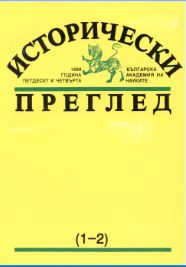Българските турци след Втората световна война
The Bulgarian Turks after the Second World War
Author(s): Valery StoyanowSubject(s): History, Ethnohistory, Political history, Social history, Recent History (1900 till today), Special Historiographies:, WW II and following years (1940 - 1949), Post-War period (1950 - 1989), History of Communism
Published by: Институт за исторически изследвания - Българска академия на науките
Summary/Abstract: The article examines the attempts of the communist authorities at a total solution of the “Turkish problem” in compliance with the actual Soviet views on the national question an in view of the Bulgarian-Turkish confrontation at the time of the opposition between the blocs. The two principal stages of the new policy, coinciding most generally with the Stalin and Zhivkov “eras” in modern Bulgarian history, are outlined. At the same time they are additionally differentiated according to the changes at the top of the Bulgarian (respectively Soviet) Party and State leadership. If up to the April plenary session of the CC of the Bulgarian Communist Party (1956), for instance, the authorities had stimulated Turkish cultural autonomy, trying to sever the national self-identification from the religious aspect, after that began the reverse process of gradual limitation of the rights of that population so that with restrictive measures it might be incorporated into the titular Bulgarian people. Under both G.Dimitrov and V.Chervenkov, the solving of the “Turkish problem” was sought within the framework of Stalin’s national policy. Whereas in the 40s that had still been justified with a view to the expected Balkan Federation in which, following the Soviet model, should find a solution also the disputed national issues, later the Soviet model was imposed in the conditions of a (one) national state which inevitably led to contradiction between the interests of national security and the right to self-determination of the Turks. In the course of de-Stalinization, therefore, was adopted a policy of a gradual but ever more inclusive incorporation of the Turkish population. This course was in conformity with the thesis raised by Khrushchev of accelerated rapprochement of the nationalities of the USSR until their complete fusion into a "Soviet socialist nation" with Russian language, and it was not surprising that the adept of his policy T.Zhivkov consistently applied the new Soviet concepts on the national question. Already in 60s came into use the term “Socialist Bulgarian Nation” and measures were taken “to speed up the natural process of overcoming the ethnic differences”, and when L.Brezhnev raised the question of the "united Soviet People" as a new stage along the road of integration, in this country appeared also the concept of "united socialist Bulgarian nation". The road to it passed through renaming the entire Turkish population, gradual replacement of the religious rites by ethnically neutral ones and the creation of prerequisites in the last stage that culminated after 1984 the deletion of all signs of the Turkish ethnic identity.
Journal: Исторически преглед
- Issue Year: 1998
- Issue No: 1-2
- Page Range: 95-133
- Page Count: 39
- Language: Bulgarian
- Content File-PDF

